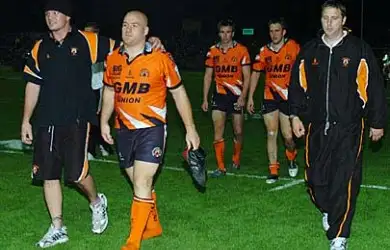The Super League Revolution – Part 5

Promotion and relgation to and from the Super League was still alive and kicking during the early to mid-noughties. As mentioned, Huddersfield spent a year outside the elite division following season after season at the bottom of the pile. Halifax were relegated at the end of 2003 after financial difficulties at the club began to take their toll on the team’s results. They finished the season with just one victory and, to rub salt in the wounds, they were deducted the two points they earned for that win due to salary cap breaches, meaning they ended the campaign without a point.
In 2004, Castleford, who had featured in the play-offs earlier in the decade, were relegated, despite picking up 6 victories. The Tigers regained promotion the season after but were relegated again in 2006, condemning Terry Matterson and his men to another season in National League One.
In between all this, Leigh had gained promotion at the third attempt, following successive grand final defeats, and took their place in the 2005 Super League. The Centurions were way out of their depth though and looked dead-certs for the drop right from the opening round. Controversially, Widnes were relegated along with the Centurions to accomodate a newly formed side – Les Catalans Dragons.
The Dragons, based in Perpignan, represented a renewed effort to establish a Super League side in France. Where Paris had failed though, the Dragons prospered because, unlike Paris, Perpignan was a city in the middle of the French rugby league heartlands. The new team was given a three season exemption from relegation, a stipulation which resulted in the Tigers’ relegation in 2006, despite finishing above Les Catalans in the table.
This episode signalled the end of promotion and relegation as we knew it. Hull KR and Castleford won places in Super League through the traditional method before, at the end of the 2007 season, it was announced that a licensing system was to be introduced. This meant that clubs applied for a place in the top division every three years on the back of their on and off-field strengths. The criteria any prospective applicant must meet concerns facilities, attendances, finances, player strength, salary cap breaches and geographical location. The first licenses were awarded at the end of the 2008 season. No teams were relegated and franchise places were awarded to Salford City Reds, who had been relegated a season earlier, and Welsh club Celtic Crusaders.
The next set of licenses will be awarded at the end of the 2011 season with Halifax, Leigh, Widnes, Barrow and Toulouse, now competing in the English Championship, all putting forward strong cases for their inclusion. The likes of Castleford, Wakefield and Salford, who were awarded places in 2008 on the strength of their plans to move to new stadia, are all behind schedule and yet to deliver on their promises. Their future at the top level will be under severe threat if evidence of progress isn’t seen over the next twelve months.
The introduction of the licensing system has been met with fierce criticism from some quarters, with many suggesting that taking away traditional promotion and relegation is sanitising the sport and robbing it of the drama of ‘beating the drop’. Others claim that it’s merely a vehicle to allow the RFL to cherry-pick who it wants in it’s premier competition and who it doesn’t.
Advocates of the new system argue that traditional promotion and relegation is flawed as a concept, particularly when it comes to British rugby league. Indeed, many clubs have almost bankrupted themselves chasing the Super League dream. The new system, it’s supporters say, allows these clubs to plan slowly and prepare more thoroughly – leaving them better-equipped for life at the top level.
Whichever way you look at it, the scrapping of relegation and promotion in our sport represents a major change in the psyche of the competition. Is it the right way to develop our game? Only time will tell.